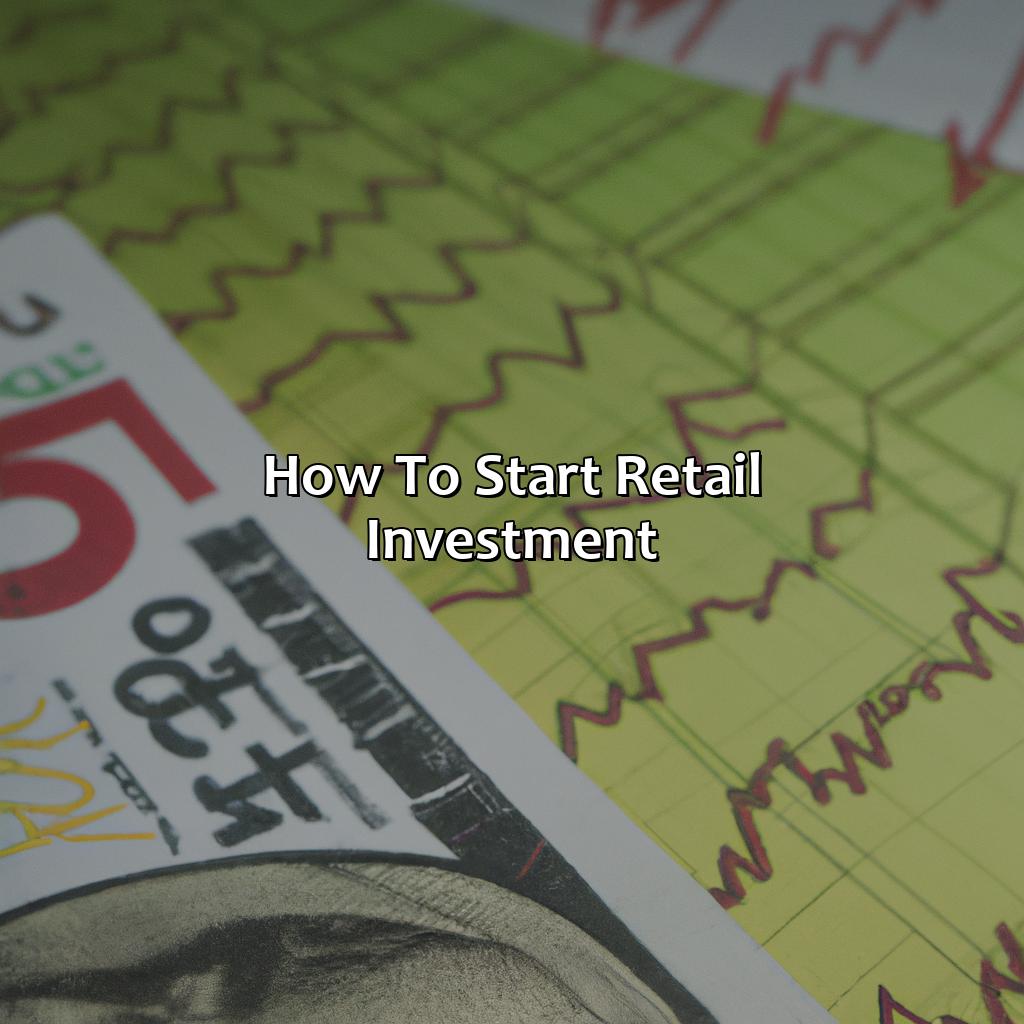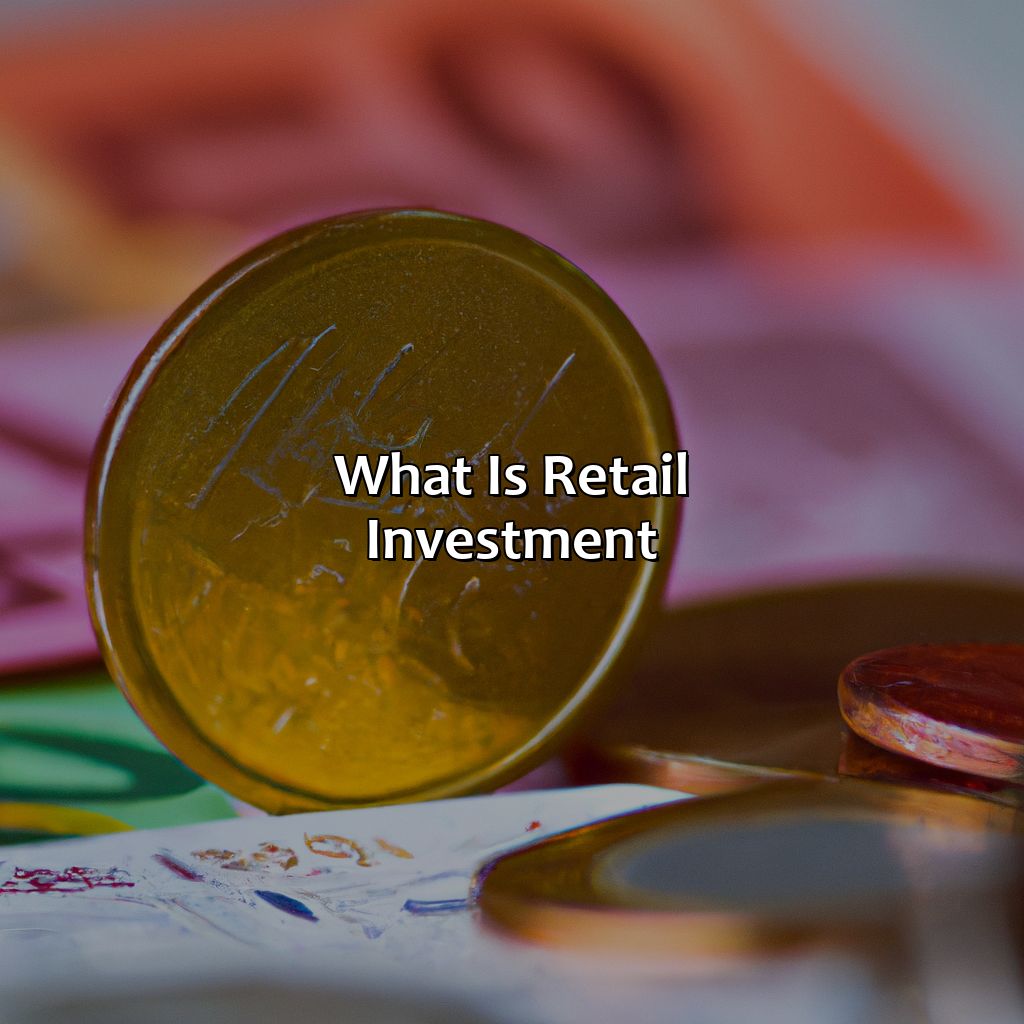What Is Retail Investment?
Key Takeaway:
- Retail investment refers to the purchase and sale of financial assets by individual investors, rather than institutional investors or corporations.
- The most common types of retail investments include stocks and shares, mutual funds, exchange-traded funds (ETFs), bonds, and real estate.
- Retail investment provides the potential for high returns, but also carries the risk of losing money. It is important to diversify investments and consider liquidity when making investment decisions.
- To start retail investment, individuals should set financial goals, choose an investment platform, and select suitable investment options based on their risk tolerance and investment objectives.
Are you looking to expand your financial portfolio? Retail investment may be the option for you. Learn more about this key strategy and unlock potential benefits for your financial future. You’ll be on your way to financial freedom in no time.
Types of Retail Investment
To comprehend diverse retail investments, dive into “Types of Retail Investment“. Sub-sections include Stocks and Shares, Mutual Funds, Exchange-Traded Funds, Bonds, and Real Estate. Based on your financial aims and appetite for risk, these subsections offer varied investment solutions to choose from.

Image credits: retiregenz.com by Yuval Duncun
Stocks and Shares
Stocks and shares are financial instruments that can be bought and traded in various ways to make a retail investment.
- Shares represent ownership in a company and usually offer the potential to earn capital gains through price appreciation or dividends.
- Common stocks are the most prevalent type of share, while preferred stocks have a higher priority for dividends but usually offer less potential for growth.
- Bonds are another type of investment that can be purchased in retail markets. They represent loans made to companies or governments and provide fixed interest income over a specified period.
- Exchange-traded funds (ETFs) offer diversified portfolios of stocks or bonds that are traded like individual shares on stock exchanges.
- Mutual funds pool money from multiple investors to buy portfolios of stocks, bonds, or other assets managed by professional fund managers.
Some companies offer direct stock purchase plans (DSPPs) that allow individuals to invest directly in company shares. However, it is important to research and consider risks before making any investments.
As with all types of retail investments, it is crucial to do thorough research and understand the potential risks and returns involved before making any decisions. Investors should stay informed about market trends and changes in their portfolio, consulting with a financial advisor as needed. Don’t miss out on opportunities for successful retail investing – take proactive steps today.
Mutual funds: Because you can’t trust yourself with your own money, so you let a bunch of strangers do it for you.
Mutual Funds
Investing in funds where multiple investors pool their savings is a popular way to invest in the financial markets. These funds are formed and managed by investment firms, who use the invested capital to purchase a diversified portfolio of assets like stocks or bonds. Such investment funds are commonly known as ‘cooperative investments.’
Mutual Funds are structured entities that act as trust funds in which an investor can buy units of ownership within the pool of other investors. This allows shareholders to actively participate in the market with reduced risks through diversified portfolios.
Mutual Funds provide different types of investment options, ranging from low-to-high risk, short-term to long-term investments. Investors can invest according to their preferences and needs, from money market funds that invest in cash equivalents and fixed-income securities to equity funds that invest in stocks and other equities.
One interesting fact about Mutual Funds is that they originated in Holland in the early 18th century when pools were formed to buy high-risk bonds issued by the government but now it has emerged as one of the most popular forms of retail investments worldwide.
Who needs a personalized portfolio when you can just throw your money into a random basket of securities and hope for the best? Enter exchange-traded funds!
Exchange-Traded Funds
Investments in funds that are traded on the stock exchange are an excellent option to diversify your portfolio and manage risk. These investment options referred to as E.T.Fs, pool funds from multiple investors and invest in securities such as stocks and bonds. Unlike mutual funds, they trade on stock exchanges throughout the day. This feature makes them accessible to a broad spectrum of traders who wish to invest in the market’s various sectors.
ETFs have become increasingly trendy when it comes to retail investments. They offer low expense ratios than traditional mutual funds, which translates into higher returns on investment for investors. With over 1 trillion dollars invested globally in ETFs, it is evident that it has gained preference over other traditional techniques. The simplicity and cost-effectiveness of ETF units attract amateur retail investors who would like to actively participate in investing without following any specific strategy.
If you prefer an algorithm-based approach, then robo-advisory services offer excellent options for creating a diversified investing portfolio with ETFs. These systems rely on rules-based codes that determine what asset allocation best suits an investor’s goal or risk profile based on historical performance data.
Globally, BlackRock is the largest manager of ETF investments globally with assets under management estimated at $8tn (as of January 2021). Invesco QQQ Trust Series 1 also known as NASDAQ-100 Index Tracking Stock is widely considered the first ETF ever launched in March 1999 by Invesco Powershares Capital Management with assets worth $135 billion approximately tracked by this fund today.
Want a safe investment with guaranteed returns? Try bonds – because let’s face it, rollercoasters are for amusement parks, not your portfolio.
Bonds
Fixed-income securities that pay regular interest and have a maturity date are a type of investment known as Debt Investments. Typically, Bond investors act as creditors who loan money to entities such as governments, corporations, or municipalities in exchange for regular interest and return on their principal at the bond’s maturity date. Yield-to-maturity, credit rating, par value, and coupon rate are all crucial factors to consider when evaluating bond investments.
Bonds can vary in terms of risk level, with lower-rated bonds generally offering higher returns but carrying greater risks. Sovereign bonds are issued by the government and typically carry little default risk since governments have the power to levy taxes in order to pay back bond returns. Corporate bonds are offered by businesses seeking capital investment and offer higher yields than sovereign bonds.
Investors should also consider the length of time it will take for a bond to mature before investing in it.
Pro Tip: Investing in Treasury Inflation-Protected Securities (TIPS) can help preserve an investor’s purchasing power if inflation rises during the life of their investment.
Real estate investment: where your dreams of being a landlord collide with the harsh reality of being a plumber.
Real Estate
One of the various types of retail investments is investing in property assets. It includes properties such as commercial buildings, residential buildings, and land. Property investment offers potential returns from rental income, capital appreciation, tax benefits, and inflation hedging. However, it also involves certain risks such as market fluctuations, maintenance expenses, unstable occupancy rates, and legal issues.
To make informed real estate investment decisions, one needs to research the market trends and consult with professionals such as brokers or agents. Another aspect is asset diversification to mitigate potential losses due to external factors.
Real estate investment requires significant funds upfront; however, there are financing options like loans or mortgages available for investors. With ample opportunities in emerging markets and innovative avenues like crowdfunding or REITs (Real Estate Investment Trust), investors need to consider property investments’ potential returns and challenges carefully.
Investing in real estate can be a promising financial opportunity for those who seek long-term gains with prudent strategies and expert advice.
Don’t miss out on the chance to invest in property assets that provide potential long-term financial gains! Research market trends, seek professional advice like brokers or agents’ guidance while aiming for asset diversification to minimize probable losses. With numerous opportunities provided by crowdfunding or REITs (Real Estate Investment Trust) in emerging markets, property investments require careful consideration for their prospective returns alongside inherent challenges.
Retail investment: Because it’s not just a hobby, it’s a risky business with benefits and drawbacks.
Benefits and Risks of Retail Investment
Retail investment can offer high returns, but it has risks too. To understand them fully, you have to look closer. You should also think about diversification and liquidity. In this section, we’ll look into those sub-sections. We’ll see how they can help you reach your financial goals and affect your investment decisions.

Image credits: retiregenz.com by Harry Arnold
Potential for High Returns
As an investment option, retail investment has a potential for considerable returns. This results from the opportunity to invest in various financial products, such as stocks, mutual funds and bonds that carry different levels of risk. These investments have the potential for long-term growth and capital appreciation.
Investing in the stock market can provide high returns through price appreciation and dividend payouts. Similarly, mutual funds can provide exposure to multiple asset classes like equity, debt securities or treasury bills, which allows diversified risk management. Additionally, investing in bonds can provide stable and steady returns over time.
Notably, high returns come with high risks. Retail investors can face significant risk when attempting to beat market performance without adequate knowledge or expertise. Market volatility can also lead to rapid price changes that may result in significant losses if not managed correctly.
Investors who miss out on potential high-returns due to lack of confidence or fear of taking risks may regret it later. It is essential to research investment options thoroughly before making decisions to avoid ceding opportunities to others and securing future finances with a well-informed strategy.
Retail investment: where you can lose money faster than you can say ‘stock market crash’.
Risk of Losing Money
The volatility of the stock market poses a major financial risk to retail investors who choose to invest their money. The risk of potential losses in retail investment is a significant factor that should not be overlooked by investors seeking returns.
While investing can be highly profitable, it can also result in financial losses for investors who are not adequately equipped with the right knowledge and exposure.
It is imperative that investors undertake thorough research and examine the market before making any investments. In addition, diversifying one’s portfolio across different stocks and fund classes can help mitigate risks associated with retail investments. Furthermore, maintaining a long-term perspective on investments can help minimize unnecessary emotional decision-making from influencing one’s investments.
Amidst the lure of lucrative returns in retail investment, caution must be exercised as history has shown us that even experienced professionals have lost considerable amounts during times of economic uncertainty. Proper risk management measures and awareness of the potential risks involved are crucial for achieving success in the world of retail investment.
A prime example of this involves an investor who placed all their savings into bitcoins amid an unprecedented surge in prices several years ago. Unfortunately, this investor faced large financial losses when bitcoin prices plummeted soon after his investment was made, leading to significant distress and regret over the decision made earlier.
If you put all your investment eggs in one basket, you better hope that basket is made out of money.
Diversification
Allocating assets among various categories to reduce risk is crucial for investors. A varied Portfolio that comprises diverse investment types, industries, and markets is ‘Asset Diversification‘. This strategy helps minimise losses during a market downturn.
A single asset class’s underperformance may offset the gains made in another one; diversification ensures that there are dips but not all investments fail at once. Asset allocation should be appropriate for the investor’s financial goal and risk-bearing capacity for optimal results.
Diversification with U.S Bonds reduces portfolio fluctuations caused by equity market shocks. The same goes for Gold during currency value changes or political turmoil in markets overseas. A diversified portfolio also benefits in consistent returns from assets with complementary characteristics.
Pro Tip: It is best to ‘rebalance’ one’s assets every year or so- evaluate it against the end objective, and rebalance among primary assets according to their weightage in the portfolio after market disturbances kick-in.
Retail investment is like a box of chocolates – you never know when you’ll need that cash, but it’s reassuring to know it’s there.
Liquidity
When it comes to investment, the ease of converting assets into cash is known as Asset Liquidity. The more liquid an investment is, the easier it is to convert it without significant loss.
Liquidity is crucial in retail investment as sudden market changes could require investors to restructure or liquidate their portfolio quickly. Highly liquid investments such as savings accounts or mutual funds offer quick conversions, but may not provide high returns. On the other hand, less liquid investments like stocks or real estate may offer higher returns but come with higher risks.
It’s important to note that short-term liquidity requirements can be met through emergency funds, while long-term investments should consider low-liquidity investments for optimal returns.
Asset liquidity has a solid history of being an essential factor in determining financial stability and investment success. One notable example of the importance of liquidity can be found in the 2008 financial crisis, where lack of liquidity caused many banks and businesses to fail.
Starting retail investment is easy, just like starting a diet, the hard part is sticking to it.
How to start Retail Investment
- Set financial goals.
- Choose an investing platform.
- Pick suitable options.
- Build a strong foundation for your portfolio.
Ready to start retail investing? Know the basics first! Here’s a guide. We’ll show you how. Get your retail investment journey going!

Image credits: retiregenz.com by Joel Washington
Setting Financial Goals
Planning for Your Financial Aims
Having clear and specific financial objectives is the first step towards successful retail investment. Identifying your goals allows you to align your investment strategies, which will lead to long-term benefits. These objectives could include making a down payment on a new house, paying off college loans, retirement savings, or even short-term objectives such as buying a new car.
It’s essential to understand that these goals should be SMART (Specific, Measurable, Achievable, Relevant and Time-bound). For instance, instead of having a vague goal like “saving for retirement,” structure it as “save $500 per month for the next 30 years towards retirement.” This way, you’ll have something more concrete to work towards.
Additionally, prioritizing your goals is crucial in setting the right timeline, identifying the appropriate investments needed and evaluating risks involved in each option chosen. Having an understanding of what is most essential to you allows making informed financial decisions that are beneficial for both long- and short-term outcomes.
Finally, to ensure good returns from retail investments:
- Diversify the portfolio across different investments.
- Regularly assess portfolios against investment objectives.
- Invest in stable companies with strong revenue growth opportunities.
Choosing an investment platform is like choosing a pet – you want one that’s reliable, loyal, and won’t bite you in the wallet.
Choosing an Investment Platform
When seeking to establish investment options, it is essential to consider the perfect Investment Platform. It is important to understand different platforms and their strategies before investing.
- Availability of assets
- Cost structure
- User interface & accessibility
- Safety measures for financial data storage
Keeping an eye on the current market trends regarding Investment Platforms can give you an edge over traditional investors.
To make a wise choice, it’s important to take into account several additional factors beyond the basic ones mentioned above.
Seize this opportunity! Start investing in perfect Investment Platform today and attain your financial goals. Don’t wait till tomorrow because time and tide wait for none.
Because getting your money’s worth shouldn’t involve a magic 8-ball, it’s important to select the right investment options for you.
Selecting Suitable Investment Options
When exploring options for investing, one must consider which investment opportunities suit their personal financial goals. Here are three key factors to consider when selecting suitable investment options:
- Risk Appetite: Evaluate your tolerance risk. Decide the amount of risk that you’re ready to take on as different investment options carry varying degrees of risk.
- Liquidity: Adequate liquidity is crucial when selecting an investment option; you may require easy access to cash in case of an emergency.
- Diversification: A well-diversified portfolio consists of several low-correlation investments that work together in delivering a consistent return.
When deciding between the various choices available, always keep these points in mind. It’s necessary not to invest all your money into one form of investment and assume it’ll do well. As a result, it’s wise to spread out your investments across stocks, mutual funds or bonds so that if one falls, the other ones can rise.
Clara was considering investing her savings but wanted only the most secure option available. She put her money into fixed deposits at a bank for high interest rates and long-term deposit periods; However, the interest rates were too low for her liking after some time. This situation taught Clara that relying solely on just one approach could be harmful since diverse routes bring greater returns over time.
Five Facts About Retail Investment:
- ✅ Retail investment refers to individuals or small investors buying and selling financial assets such as stocks, bonds, and mutual funds. (Source: Investopedia)
- ✅ The retail investment market has grown substantially over the past decade, with more individuals investing their money in the stock market. (Source: Forbes)
- ✅ The rise of online investment platforms has made it easier than ever for individuals to begin investing in the stock market. (Source: Business Insider)
- ✅ Retail investors often make decisions based on their personal financial goals, risk tolerance, and investment time horizon. (Source: The Balance)
- ✅ Retail investment can be a cost-effective way to invest for the long term, but it requires careful research and analysis to make successful investment decisions. (Source: NerdWallet)
FAQs about What Is Retail Investment?
What is retail investment?
Retail investment refers to buying and selling securities or other financial assets by individuals or small investors, rather than by institutional investors or corporations. It is a common way for average people to invest in the stock market, bond market, mutual funds, or exchange-traded funds (ETFs).
What are the benefits of retail investment?
Retail investment offers several benefits, such as access to a wider range of investment opportunities, potential higher returns than traditional savings, diversification of investment portfolio, and flexibility in terms of timing and amount of investment.
What are the risks associated with retail investment?
As with any investment, retail investment also carries risks, such as the risk of losing money due to market fluctuations, inflation, interest rate changes, or company bankruptcies. It is important to do your own research, consult financial advisors, and diversify your investments to mitigate such risks.
What are some examples of retail investment?
Examples of retail investments include buying stocks of a publicly traded company, investing in mutual funds or exchange-traded funds, purchasing government or corporate bonds, or opening a retirement savings account such as an Individual Retirement Account (IRA).
What is the difference between retail investment and institutional investment?
The main difference between retail and institutional investment is the size of the investor and the amount of capital involved. Retail investment involves individual investors who typically invest smaller amounts of money, while institutional investment involves large institutions, such as banks, pension funds, or mutual funds, which invest large amounts of money on behalf of their clients or shareholders.
How can I start with retail investment?
To start with retail investment, you need to open a brokerage account with a reputable broker, such as eTrade, Charles Schwab, or TD Ameritrade. Then, you need to research and select your investment options, such as stocks, bonds, or mutual funds, and fund your account with the desired amount. You can also seek the advice of a financial advisor or use online tools to make informed investment decisions.
